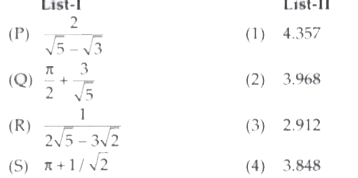is completely divisible by ?
50
51
29
8
The correct Answer is:d
To solve the problem of whether (4915−1) is completely divisible by any of the given options, we can follow these steps:
Step 1: Rewrite the expression
We start by rewriting 4915 in a more manageable form:
4915=(72)15=730
Thus, we can rewrite the original expression:
4915−1=730−1
Step 2: Apply the difference of powers formula
We can use the difference of powers formula, which states that an−bn can be factored as:
an−bn=(a−b)(an−1+an−2b+an−3b2+…+bn−1)
In our case, a=7, b=1, and n=30:
730−1=(7−1)(729+728+…+1)=6(729+728+…+1)
Step 3: Check divisibility by the options
Now we need to check if 6(729+728+…+1) is divisible by the given options: 50, 51, 29, and 8.
1. Divisibility by 50:
- 50=2×52
- The expression is divisible by 2 (since 6 is even), but not by 25 (as 729+728+…+1 is not divisible by 25).
- Conclusion: Not divisible by 50.
2. Divisibility by 51:
- 51=3×17
- The expression is divisible by 3 (since 6 is divisible by 3), but we need to check 729+728+…+1 for divisibility by 17.
- Using Fermat's Little Theorem, 716≡1mod17. Thus, 729≡713mod17 and we can compute 713 modulo 17. After calculating, we find it is not divisible by 17.
- Conclusion: Not divisible by 51.
3. Divisibility by 29:
- 29 is a prime number. Using Fermat's theorem again, 728≡1mod29. Therefore, 730≡72mod29.
- Thus, 730−1≡72−1≡49−1≡48mod29 which is not divisible by 29.
- Conclusion: Not divisible by 29.
4. Divisibility by 8:
- 8=23
- The expression 6 is divisible by 2, but we need to check if 729+728+…+1 is divisible by 4.
- Since 7≡−1mod8, 729+728+…+1≡(−1)29+(−1)28+…+1≡−1+1+…+1 (where the number of terms is 30).
- This gives us 15 terms of 1 and 1 term of −1, resulting in 15−1=14, which is divisible by 4.
- Thus, 6(729+728+…+1) is divisible by 8.
- Conclusion: Divisible by 8.
Final Answer
The expression 4915−1 is completely divisible by 8.
We start by rewriting 4915 in a more manageable form:
4915=(72)15=730
Thus, we can rewrite the original expression:
4915−1=730−1
We can use the difference of powers formula, which states that an−bn can be factored as:
an−bn=(a−b)(an−1+an−2b+an−3b2+…+bn−1)
In our case, a=7, b=1, and n=30:
730−1=(7−1)(729+728+…+1)=6(729+728+…+1)
Now we need to check if 6(729+728+…+1) is divisible by the given options: 50, 51, 29, and 8.
- 50=2×52
- The expression is divisible by 2 (since 6 is even), but not by 25 (as 729+728+…+1 is not divisible by 25).
- Conclusion: Not divisible by 50.
- 51=3×17
- The expression is divisible by 3 (since 6 is divisible by 3), but we need to check 729+728+…+1 for divisibility by 17.
- Using Fermat's Little Theorem, 716≡1mod17. Thus, 729≡713mod17 and we can compute 713 modulo 17. After calculating, we find it is not divisible by 17.
- Conclusion: Not divisible by 51.
- 29 is a prime number. Using Fermat's theorem again, 728≡1mod29. Therefore, 730≡72mod29.
- Thus, 730−1≡72−1≡49−1≡48mod29 which is not divisible by 29.
- Conclusion: Not divisible by 29.
- 8=23
- The expression 6 is divisible by 2, but we need to check if 729+728+…+1 is divisible by 4.
- Since 7≡−1mod8, 729+728+…+1≡(−1)29+(−1)28+…+1≡−1+1+…+1 (where the number of terms is 30).
- This gives us 15 terms of 1 and 1 term of −1, resulting in 15−1=14, which is divisible by 4.
- Thus, 6(729+728+…+1) is divisible by 8.
- Conclusion: Divisible by 8.
The expression 4915−1 is completely divisible by 8.
Topper's Solved these Questions
Similar Questions
Knowledge Check
- Question 1 - Select One
(9710−1024) is completely divisible by the number ?
A12B13C11D17 - Question 2 - Select One
It is given that (232+1) is completely divisible by a number. That number will certainly divide which of the following numbers?
Aa)296+1Bb)7×233Cc)216−1Dd)216+1 - Question 3 - Select One
(4913−1) is exactly divisible by
A50B51C29D8
¯¯¯¯ab+¯¯¯¯ba is completely divisible by 11 and the quotient is a+b.
View Solution(xn−an) is completely divisible by (x - a) is
View Solution(xn−an) is completely divisible by (x+a), when
View SolutionIf number 62532915a is completely divisible by 6, then the largest digit at the place of 'a' will be
View Solution(49)15−1 is exactly divisible by:
View Solution


